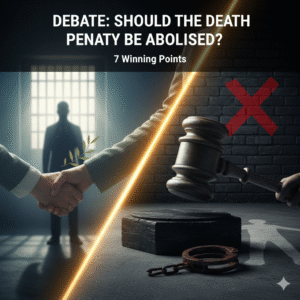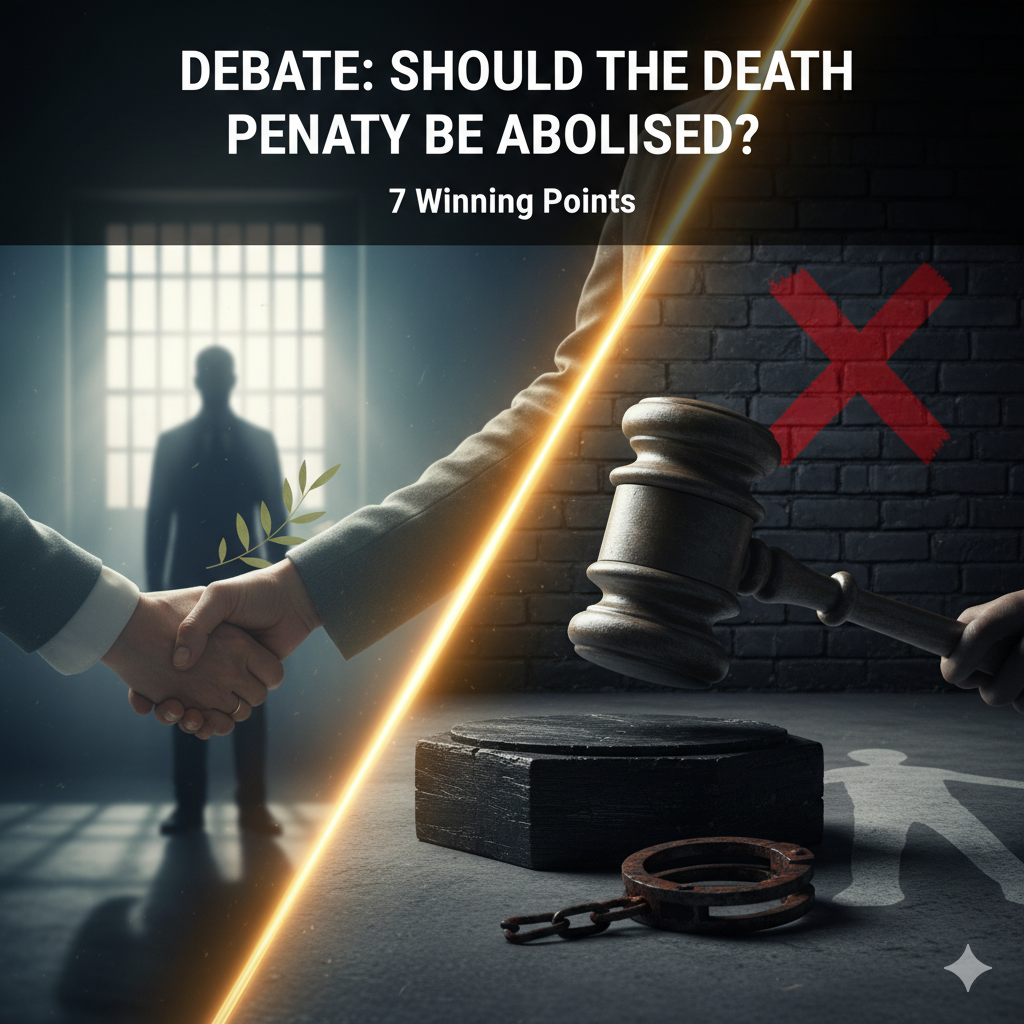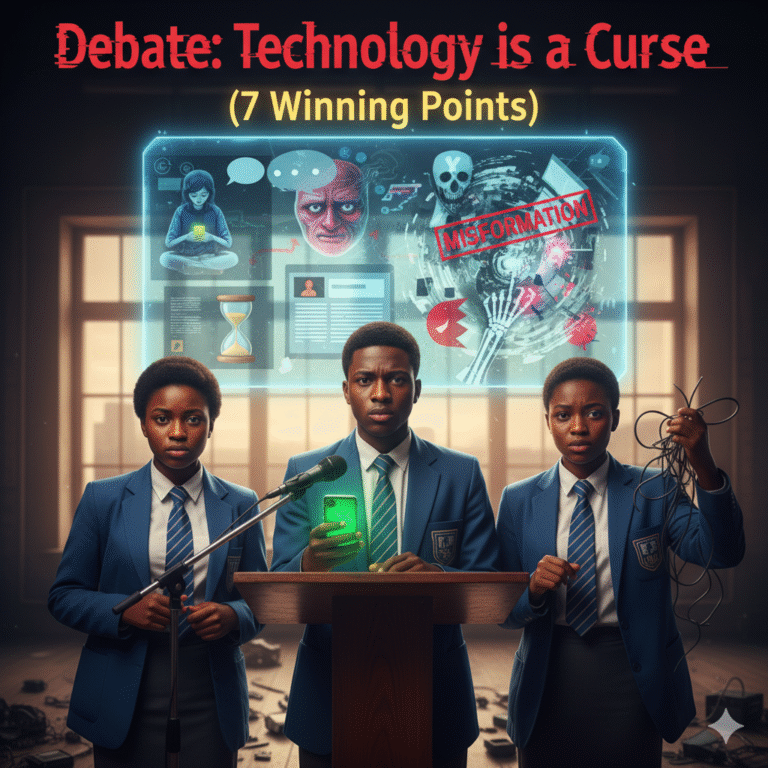Debate: The Death Penalty Should Be Abolished (7 Winning Points)
Debate: The Death Penalty Should Be Abolished (7 Winning Points)
Are you looking for the strongest, most persuasive points for your next debate? If you are supporting the motion that the death penalty should be abolished, you have come to the right place.
This is a serious topic, so let’s be clear. The “death penalty,” also known as capital punishment, is when the government sentences a person to death as punishment for a crime.
The death penalty should be abolished debate is a challenging one, and my job is to give you the winning “script” to argue your side effectively.
Disclaimer: This article provides arguments for one side of an educational debate. The goal is to help students build a strong case, not to diminish the real pain of victims or the arguments of the opposing side.

Winning Debate Points: Why The Death Penalty Should Be Abolished
1. It is a Violation of Basic Human Rights
Good day, Mr. Chairman, panel of judges, co-debaters, and all students present. My first and most important point is that the death penalty is a direct violation of our most basic human rights.
The most fundamental right is the “right to life.” This is a right we are all born with. When the government executes a person, it is taking away that right. It is a cruel, inhuman, and degrading punishment.
We cannot pick and choose who deserves human rights. Even if a person has committed a terrible crime, they are still a human being. As the United Nations states, the death penalty is incompatible with human dignity. Taking a life for a life makes the government just as violent as the criminal.
2. The Risk of Executing an Innocent Person is Too High
My second point is a frightening one. Our justice system is run by humans, and humans make mistakes.
What happens when that mistake cannot be undone?
Witnesses can be wrong. Evidence can be mishandled. A person can be wrongly convicted. If that person is in jail, they can be freed and compensated. But if that person is executed? That is a final mistake. It is irreversible.
We can never be 100% certain of guilt in every single case. The Innocence Project, a group that works to free the wrongly convicted, has shown hundreds of cases where new evidence proved a person on death row was innocent. We cannot accept a system that risks executing even one innocent person.
3. The Death Penalty Does Not Deter Crime
Now, let’s talk about what the other side will say. They will argue that we need the death penalty to scare people from committing terrible crimes.
The truth is, it doesn’t work.
There is no credible evidence, none at all, that the death penalty is an effective deterrent. Many studies have compared crime rates in countries with the death penalty and countries without it. They find no difference.
A criminal who is about to commit a crime is not thinking about the long-term consequences. They are often acting in anger, or under the influence, or they simply don’t believe they will be caught. Life imprisonment is just as much of a punishment, but without the brutal side effects.
4. It is Applied Unfairly and is Biased
My fellow students, the application of the death penalty in the real world is not fair. It is not about who committed the worst crime, but about who has the worst lawyer.
The system is deeply biased against the poor. If you are wealthy, you can afford a team of the best lawyers to fight for you. If you are poor, you must rely on an overworked, often underpaid, public defender.
This is why people from poor backgrounds are far more likely to be sentenced to death. This isn’t justice. It’s a system where the quality of your defence depends on the amount of money in your pocket, and that is simply wrong.
5. It Denies the Chance for Rehabilitation
We believe that the purpose of a justice system should be… well, justice. And justice should include the possibility of rehabilitation.
People can change. A person who committed a terrible crime can feel remorse, they can be educated, and they can find a way to pay back their debt to society, even from within prison. The death penalty removes this possibility forever.
By sentencing someone to death, we are saying they are beyond all hope, that they are incapable of change. This is a very dark and final judgement that no human should have the right to make.
6. It is an Irreversible Punishment
This point is so important it needs to be repeated. The death penalty is final. It is irreversible.
Think about it. Our knowledge of science changes. New technology, like DNA testing, becomes available. A case that seemed “certain” 20 years ago can be proven wrong today.
If a person is in prison for life, we can correct that mistake. We can release them. We can apologize. But we cannot bring a person back from the dead. This death penalty should be abolished debate must acknowledge that a system that makes mistakes should never be allowed to use a punishment that is irreversible.
7. It Creates a New Cycle of Violence
My final point is about the kind of society we want to live in. When the government executes someone, it is using premeditated violence.
This teaches our society that “an eye for an eye” is the right way to handle problems. It promotes revenge, not justice. It creates a new set of victims: the family of the executed person, who must also suffer a loss.
We cannot stop violence by committing more violence. We must be better. We must choose a path of justice that is firm, but also values life. Abolishing the death penalty is a step towards a more civilized and compassionate society.
Frequently Asked Questions (FAQs)
Q: What is the strongest argument for the death penalty? A: The strongest argument is usually “retribution.” This is the “eye for an eye” idea—that a person who has taken a life deserves to lose their own life as a just punishment.
Q: Is life imprisonment a better alternative? A: Yes. Life imprisonment is a severe and just punishment. It protects society, but it avoids all the problems we just talked about. It’s not biased, it’s reversible if a mistake is found, and it allows for the small possibility of rehabilitation.
Q: Why is this death penalty should be abolished debate so common? A: Because it touches our deepest values—our belief in human rights, our ideas of justice, and our fear of crime. It’s a topic where law, morals, and emotions all crash together.
Conclusion / Summary
So, to summarize my case: we must support the motion that the death penalty should be abolished.
Why? Because it is a violation of fundamental human rights, it carries the terrible and unacceptable risk of killing innocent people, and it is completely irreversible. Furthermore, it is not an effective deterrent, it is applied unfairly to the poor, and it denies any hope of rehabilitation.
Final Disclaimer: We must always remember the victims of crime and their families. They deserve our full support and compassion. This debate is not about ignoring their pain. It is about whether capital punishment is a just, fair, or effective part of a modern justice system. For the reasons I’ve given, it is not.
What do you think? Drop your opinions or your own debate points in the comments section below.
Also, feel free to share this post with your coursemates or those in your debate team!







